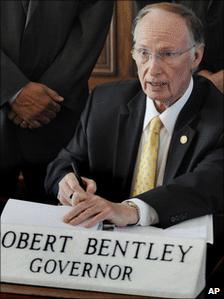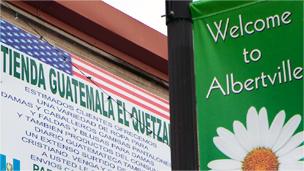Alabama's tough new immigration law
- Published
In Albertville, Alabama, opinions are split on the stricter immigration laws
In a trailer park in the US state of Alabama, the reality of a strict new anti-illegal immigration law comes to the fore, a reality that cuts through the blaming, the endless bickering, the legal and political manoeuvring that preceded its enactment.
An illegal immigrant hides in a small caravan, his hands filthy from manual labour, fearful he will be captured and deported.
"Without his father how will my son grow up?" the Mexican native asks as his six-year-old boy plays outside.
"If they send me back how will my son be able to afford to go to college?"
An estimated 11.2 million undocumented immigrants live in the US, including 120,000 in Alabama, most of whom work in backbreaking agricultural jobs under the hot southern sun.
Growing frustration
In two months, the harsh new immigration law takes effect in the state, aimed in part at making life so difficult for illegal immigrants they will quit the state.
The law's supporters say it is the product of growing frustration in state capitals with the inability of the US federal government in Washington to handle the problem.
"It's a local movement to put increasing pressure on the federal government," says Albertville City councilman Nathan Broadhurst.
The new Alabama legislation will require schools and employers to find out whether their students and workers are in the country legally. It will also make it a crime knowingly to give a lift or rent a room to an undocumented worker.
The state's police will also get sweeping new powers. If, in the course of their duties, they come across anyone whose status is suspect they will be able to detain them without question.
'Harassment'
Advocates for illegal immigrants have criticised the new law as racist and mean-spirited, and have pledged to challenge it in court.

Governor Robert Bentley has cited "a real problem with illegal immigration"
"It's already devastating migrant families," says Dr Ellin Jimmerson, a church minister and documentary film maker from Huntsville, Alabama, and a long-time advocate for migrant workers' rights.
"It will give the authorities more permission to harass them."
Alabama is just one of several US states enacting laws aimed at flushing out undocumented workers.
Governors, local officials and many voters see undocumented workers as a threat to their local economies in a time of high unemployment.
''This is a jobs-creation bill for Americans,'' Republican Alabama Representative Micky Hammon, a chief sponsor of the bill, said in June.
''We really want to prevent illegal immigrants from coming to Alabama and to prevent those who are here from putting down roots."
'No amnesty'
Last year Arizona passed a law broadening police powers that attracted worldwide attention for its "attrition through enforcement" doctrine.

Illegal migrants in Alabama often do backbreaking agricultural work at minimal wages
Neighbouring Georgia has also introduced new immigration laws, as has South Carolina.
Historically, immigration has been seen as the province of the federal government in Washington, and while Washington acknowledges the US system has failed, recent efforts to overhaul the system have become mired in political gridlock.
Bipartisan efforts in 2006 and 2007 were beaten back by conservative Republicans who opposed what they described as "amnesty" for lawbreakers.
More recently, President Barack Obama has called for a broad programme of immigration reform, including a path to citizenship, increased border security and improvements in the existing immigration system.
But amid a halting economy and an epic fight over healthcare reform, Mr Obama has had little political capital to spare to push for immigration reform.
A more modest Democratic bill that would have created a path to citizenship for some illegal immigrants who came to the US as children stalled last year under determined opposition from Republicans.
Living in fear
Which party is to blame for the lack of progress matters little to the Hispanic families living in the trailer parks that surround Albertville.
Many residents have already left ahead of the new laws coming into force, and those that remain, legal and illegal, are living in fear.
"We can't really go anywhere or do anything," says one local American woman too scared to give her name.
She is married to an undocumented worker and they have a young son together. The family is terrified he will be caught by the authorities and deported.
Meanwhile, Albertville Chief of Police Doug Pollard says the new laws are a welcome addition to his legal arsenal.
"If it's the gang members and the people who started brothels that have moved out," he said, "that's fine by me."
- Published10 June 2011
- Published4 July 2011
- Published26 May 2011